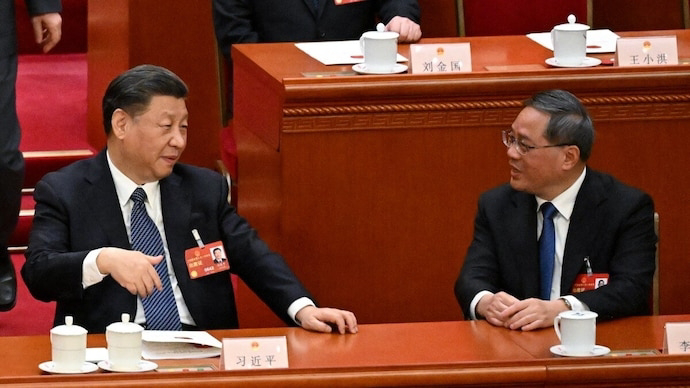Why is Xi Jinping skipping the G20 summit in Delhi?
The G20 summit is one of the most important events in the global calendar, where leaders of the world's 20 major economies gather to discuss and coordinate policies on various issues such as trade, climate change, health, and development. This year, India is hosting the G20 summit in Delhi on September 9 and 10, with the theme of "Resilient, Inclusive and Sustainable Recovery". However, not all leaders are expected to attend the summit in person. Among them, the most notable absentee is Chinese President Xi Jinping, who is likely to skip the summit and send Premier Li Qiang as his representative.
This will be the first time that Xi Jinping will skip a G20 summit since he became China's president in 2013. He has attended all previous G20 summits, either in person or virtually. So why is he skipping the summit this time? What does it mean for China-India relations and the global order?
Possible reasons for Xi's absence
There is no official word either from China or from India on why Xi Jinping is not attending the G20 summit in Delhi. However, there are some possible reasons that can be speculated based on the current situation and context.
- COVID-19 pandemic: China has been very strict in its COVID-19 prevention and control measures, imposing lockdowns, travel restrictions, and quarantine rules whenever there is a new outbreak. China has also been reluctant to reopen its borders to international travelers, especially from countries with high infection rates. Therefore, it is possible that Xi Jinping does not want to risk exposing himself or his entourage to the virus by traveling abroad. Moreover, China may not want to send a signal that it is relaxing its COVID-19 stance by allowing its president to attend an international event.
- Domestic politics: Xi Jinping is preparing for the 20th National Congress of the Communist Party of China (CPC) next year, where he is expected to secure a third term as the party's general secretary and the country's supreme leader. This is a crucial moment for Xi Jinping, as he faces challenges from within and outside the party, such as factional rivalries, economic slowdown, social discontent, and international pressure. Therefore, he may want to focus on consolidating his power and authority at home, rather than engaging in diplomacy abroad. He may also want to avoid any potential embarrassment or confrontation at the G20 summit, where he could face criticism or questions from other leaders on issues such as human rights, Hong Kong, Taiwan, Xinjiang, and the South China Sea.
- Border dispute with India: Another possible reason for Xi Jinping's absence is the ongoing border dispute with India along the Line of Actual Control (LAC) in the western sector of the India-China border areas. The dispute escalated into a violent clash in June 2020 at Galwan Valley, resulting in casualties on both sides. Since then, both sides have held several rounds of military and diplomatic talks to de-escalate the situation and restore peace and stability. However, there has been little progress in resolving the core issues or disengaging from the friction points. Therefore, Xi Jinping may not want to meet Prime Minister Narendra Modi face-to-face at the G20 summit, as it could be seen as a sign of weakness or compromise by his domestic audience or his hardline supporters. He may also want to avoid any public display of hostility or tension with Modi, as it could damage the image of China as a responsible global power.
Implications for China-India relations and global order
Xi Jinping's decision to skip the G20 summit in Delhi has significant implications for China-India relations and the global order. On one hand, it could be seen as a missed opportunity for dialogue and cooperation between the two Asian giants, who share common interests and challenges on many global issues such as climate change, pandemic response, economic recovery, and multilateralism. On the other hand, it could also be seen as a reflection of the deep mistrust and divergence between the two countries, especially on bilateral issues such as border dispute, trade imbalance, connectivity projects, and regional security.
Xi Jinping's absence could also affect the dynamics and outcomes of the G20 summit itself. As the world's second-largest economy and a major player in global governance, China's presence and participation are crucial for reaching consensus and coordination among the G20 members on various agenda items. Without Xi Jinping at the table, China's voice and influence may be diminished or marginalized at the summit. Moreover, Xi Jinping's absence could create more space and opportunity for other leaders such as US President Joe Biden, European Union President Ursula von der Leyen, Japanese Prime Minister Yoshihide Suga, and Australian Prime Minister Scott Morrison to shape and steer the discussions and decisions at the summit.
In conclusion, Xi Jinping's decision to skip the G20 summit in Delhi is a significant and surprising move that has multiple and complex reasons and implications. It shows that China is facing multiple challenges and pressures at home and abroad, and that it is adopting a cautious and defensive posture in its foreign policy. It also shows that China-India relations are still strained and uncertain, and that the global order is undergoing profound changes and adjustments. The G20 summit in Delhi will be a test and an opportunity for the leaders of the world's major economies to demonstrate their vision, leadership, and cooperation in addressing the common challenges and opportunities facing humanity in the post-pandemic era.
Source:
(1) Chinese President Xi Jinping to skip G20 summit in Delhi. https://www.thehindu.com/news/national/chinese-president-xi-jinping-to-skip-g20-summit-in-delhi/article67265958.ece.
(2) After Putin, Xi Jinping to skip G20 summit in Delhi. https://www.rediff.com/news/report/after-putin-xi-jinping-to-skip-g20-summit-in-delhi/20230903.htm.
(3) China's Xi Jinping To Skip ASEAN & East Asia Summits In Jakarta, G20 Summit In Delhi. https://www.republicworld.com/world-news/china/chinas-xi-jinping-to-skip-asean-and-east-asia-summits-in-jakarta-g20-summit-in-delhi-articleshow.html.
(4) Chinese President Xi Jinping to skip G20 Summit, Li Qiang to lead side .... https://www.indiatoday.in/india/story/chinese-president-xi-jinping-to-skip-g20-summit-li-qiang-to-lead-side-2430208-2023-09-02.
(5) China's Xi Jinping likely to skip G20 Summit in Delhi: Report. https://www.businesstoday.in/latest/in-focus/story/chinas-xi-jinping-likely-to-skip-g20-summit-in-delhi-report-396335-2023-08-31.






0 Comments